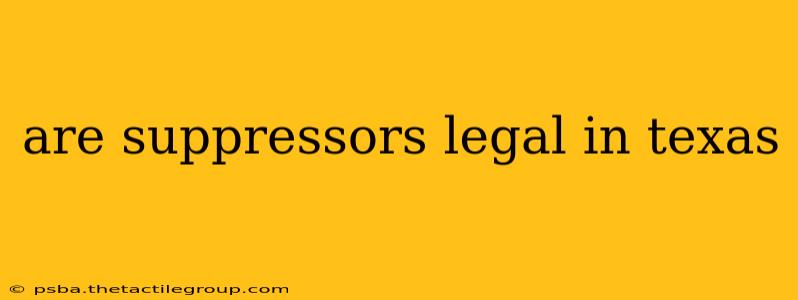The legality of suppressors, often mistakenly called silencers, in Texas is a complex issue with nuances that require careful understanding. This guide will clarify the laws and regulations surrounding suppressor ownership and use in the Lone Star State.
Texas Suppressor Laws: The Basics
In short, suppressors are legal in Texas for individuals who meet specific legal requirements. However, owning and using a suppressor involves navigating federal and state regulations, licensing procedures, and proper registration. It's crucial to understand these aspects to ensure compliance with the law.
Federal Regulations: The National Firearms Act (NFA)
The foundation of suppressor legality in Texas, and across the US, lies in the National Firearms Act (NFA) of 1934. This federal law classifies suppressors as National Firearms Act (NFA) items, subjecting them to strict regulations, including:
- Registration: All suppressors must be registered with the Bureau of Alcohol, Tobacco, Firearms and Explosives (ATF). This involves a rigorous background check and a lengthy waiting period.
- Tax Stamp: A $200 tax stamp is required for each suppressor registered.
- Serial Number: Every suppressor must have a unique serial number.
Failure to comply with these federal requirements can lead to severe penalties, including hefty fines and imprisonment.
State Regulations: Texas's Role
Texas generally follows federal guidelines concerning suppressors. The state doesn't have any additional laws that prohibit their possession, provided the owner adheres to all federal NFA regulations. This means that Texas law doesn't add extra restrictions or hurdles beyond the existing federal framework.
Obtaining a Suppressor Legally in Texas
The process of legally owning a suppressor in Texas mirrors the federal process:
- Application: You must submit an ATF Form 4 application. This involves providing detailed personal information, fingerprints, and photographs.
- Background Check: The ATF conducts a thorough background check to ensure you meet the eligibility criteria. This includes a check for felony convictions, domestic violence charges, and other disqualifying factors.
- Tax Payment: You must pay the $200 tax stamp.
- Waiting Period: Expect a significant waiting period (often several months) for the ATF to process your application and approve your purchase.
- Legal Purchase: Once approved, you can legally purchase the suppressor from a licensed firearms dealer.
Important Considerations:
- Dealer Licensing: Only licensed firearms dealers who are registered with the ATF can sell NFA items like suppressors.
- Storage: Suppressors must be stored in accordance with state and local laws concerning firearm storage.
- Transportation: Transporting a suppressor requires adherence to federal and state laws concerning firearm transport. This often means keeping the suppressor securely locked and unloaded during transit.
- Use: The use of suppressors is subject to the same laws and regulations that govern the use of firearms. Discharge in prohibited areas is illegal, and responsible firearm handling practices are paramount.
Conclusion: Navigating Texas Suppressor Laws
While suppressors are legal in Texas under specific circumstances, understanding and following both federal (NFA) and state regulations is paramount. The process involves several steps, including a background check, tax payment, and a waiting period. Always consult with legal counsel and ensure you comply with all applicable laws before purchasing or possessing a suppressor. Failure to do so can result in severe legal consequences. This information is for guidance only and does not constitute legal advice. Always consult a legal professional for advice tailored to your specific situation.

